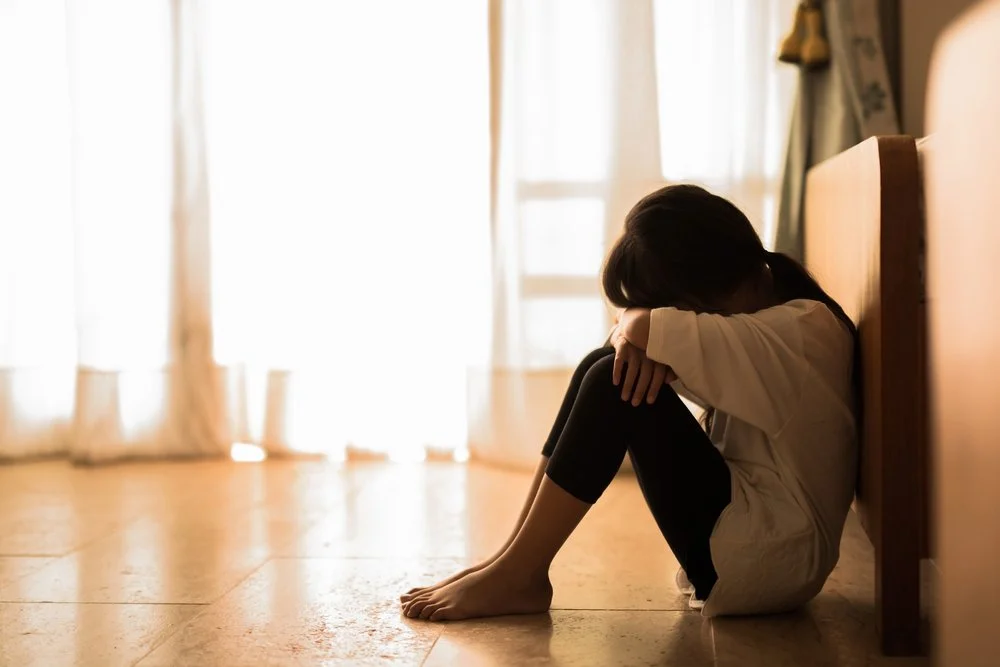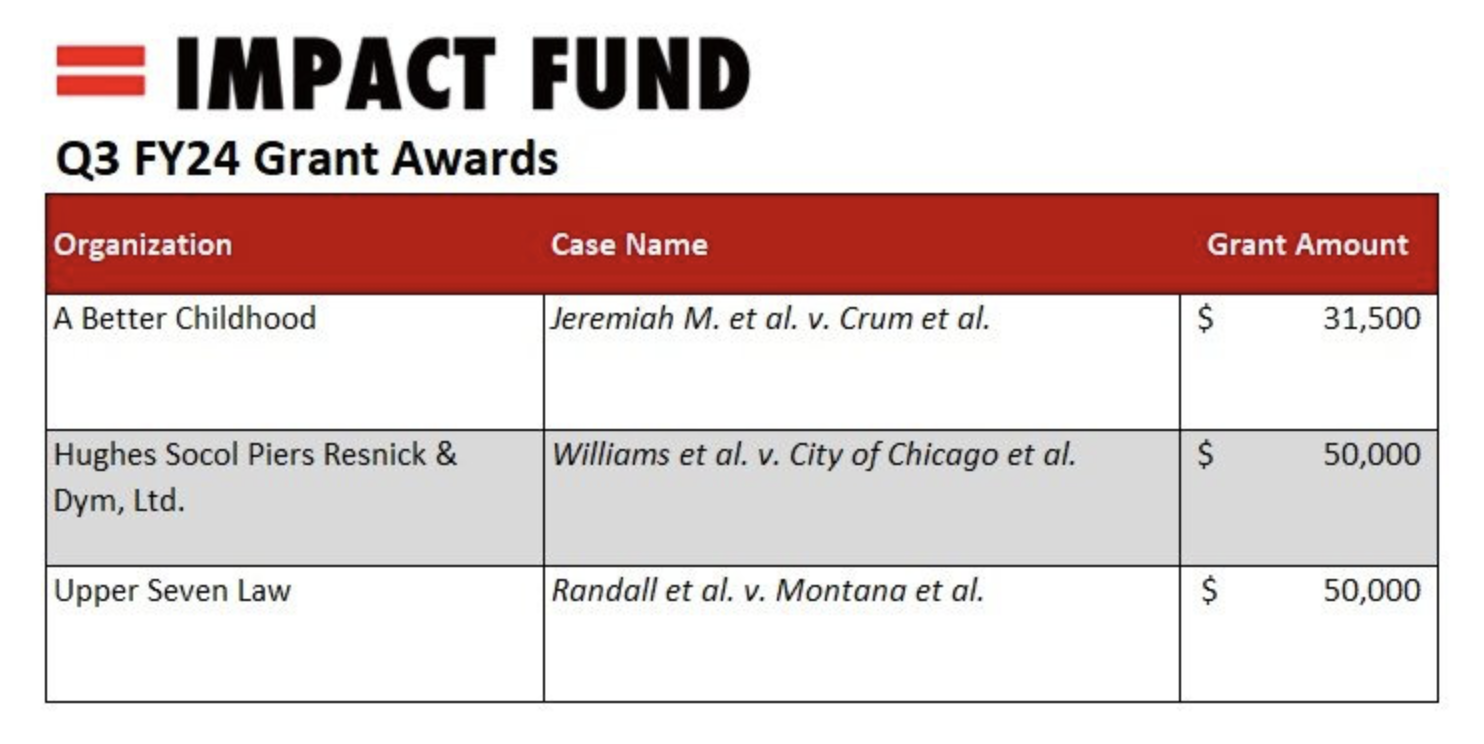Impact Fund Spring Grants Support Women, Kids, and People of Color Seeking Justice
Sanjana Manjeshwar - Grant Program Associate
In our spring grantmaking cycle, we granted $131,500 to support three impact lawsuits across the country. Our new grantees are doing incredible work to protect the rights of foster youth, challenge the racially biased use of surveillance technology, and prevent gender discrimination in insurance pricing. We are grateful to be supporting these important cases—these are the compelling stories behind them.
Protecting the Rights of Foster Children in Alaska
In Jeremiah M. et al. v. Crum et al., a class action lawsuit against Alaska’s foster care system, A Better Childhood is seeking to protect foster youth in Alaska from neglect and abuse.
Currently, there are at least 3,000 children in Alaska’s foster care system, the majority of whom are Alaska Native children. Many of these children have been removed from their homes in an effort to ensure their safety—however, instead of protecting them, the foster care system has placed them into yet another dangerous and unstable situation.
Foster children in Alaska are often shuffled across multiple homes and further isolated from their families and communities.
Due to limited resources and a lack of adequate placements, foster children in Alaska are often shuffled across multiple homes and further isolated from their families and communities. These children sometimes end up in out-of-state facilities, overly restrictive institutions, and even homeless shelters. Lana H., one of the children bringing the case on behalf of the class, is 14 years old and has spent time in 17 different placements since she entered the foster care system in 2018. This instability is especially a problem for Alaska Native children, who are often placed in non-Native homes and risk losing their connection to their Native culture. In addition, foster children with disabilities are frequently denied the medical care and accommodations they need.
Through this case, A Better Childhood aims to significantly reform Alaska’s foster care system. According to the lawsuit, the state of Alaska has long been aware of the problems present in its foster care system, but it has done little to solve them. The potential reforms sought by the litigation include providing better training for caseworkers, ensuring adequate mental health care for foster children, making efforts to place Alaska Native children in culturally appropriate foster homes, and ensuring that foster children can be reunited with their families when possible.
Confronting the Discriminatory Use of Surveillance Technology
Hughes Socol Piers Resnick & Dym, Ltd., a Chicago law firm, is working with Black and Latine communities in Chicago in the case Williams et al v. City of Chicago et al. This case is a class action against the city of Chicago for its racially discriminatory deployment of the gunfire detection system ShotSpotter.
The company behind ShotSpotter claims that its noise detection sensors can identify when and where a gunshot has been fired. Any time a ShotSpotter sensor in Chicago detects supposed gunfire, police are deployed to the area. However, the alerts are often inaccurate—over 90% of the time, police find no gun-related incident, and ShotSpotter alerts result in more than 30,000 unnecessary police deployments every year.
The communities behind the lawsuit allege that the city’s use of ShotSpotter is racially biased, and that this, in turn, exacerbates police violence against people of color.
The communities behind the lawsuit allege that the city’s use of ShotSpotter is racially biased, and that this, in turn, exacerbates police violence against people of color. ShotSpotter sensors cover nearly all of Chicago’s South and West Sides, which have the highest percentages of Black and Latine people in the city. White Chicago residents are much less likely to live in a ShotSpotter area, compared to Black and Latine Chicago residents. ShotSpotter alerts are often used as a justification for aggressive police tactics, such as stop-and-frisks and illegal detentions, which already disproportionately target people of color. People are frequently treated as suspects just because they happen to be near the location of an alert, despite the fact that these alerts are often unfounded. This can lead to terrible situations—for example, in August 2021, after receiving a ShotSpotter alert, Chicago police fatally shot 13-year-old Adam Toledo.
According to the people bringing the lawsuit, ShotSpotter does nothing to meaningfully improve public safety, and instead violates Chicago residents’ constitutional rights. Their ultimate goal is to end the city’s use of ShotSpotter. They are also seeking damages to compensate people who were unjustifiably arrested and incarcerated due to an inaccurate ShotSpotter alert.
Challenging Gender Discrimination in Insurance Pricing
In the gender discrimination class action Randall et al. v. Montana et al., Upper Seven Law, a Montana nonprofit, is representing women and unmarried people challenging a state law that allows insurance companies to discriminate on the basis of gender and marital status.
In Montana, a state law allows insurance companies to discriminate on the basis of gender and marital status.
Under HB 379, insurance companies are allowed to charge customers less or more depending on their gender. While some legislators argued that this law might benefit women, research shows that women are now charged more for insurance when gender can be considered, even in situations such as driving, where men are more likely to engage in risky behaviors. According to the communities affected by these price differences, HB 379 has enabled obvious discrimination towards women and single people in Montana. HB 379 is especially harmful because many Montana residents live in rural areas and rely exclusively on car transportation, so they have no choice but to pay for auto insurance. Moreover, HB 379 bans people from suing insurance companies for gender discrimination under state law, so they have no way to seek accountability when they are discriminated against.
The people and organizations bringing the lawsuit are asking for Montana to explicitly prohibit the consideration of gender and marital status in ratemaking decisions across all forms of insurance (which it did for decades, before HB 379 was passed in 2021). Upper Seven Law also hopes that the data uncovered by the case could be useful for future advocacy against insurance companies who use discrimination to maximize their profits.
In our spring grantmaking cycle, we granted $131,500 to support three impact lawsuits across the country.
Our new grantees’ cases demonstrate how class actions can be an important tool in the fight to hold powerful entities accountable. We are excited to follow the progress of these cases in the coming years, and we are so grateful for our grantees’ work on behalf of communities facing injustice.
Each quarter, we make grants to support impact litigation in pursuit of economic, environmental, racial, and social justice. To learn more about our grant program and upcoming grant application deadlines, check out the “Apply” page of our website or contact us here.





